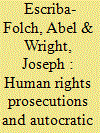|
|
|
Sort Order |
|
|
|
Items / Page
|
|
|
|
|
|
|
| Srl | Item |
| 1 |
ID:
132972


|
|
|
|
|
| Publication |
2014.
|
| Summary/Abstract |
When the leader of an autocratic regime loses power, one of three things happens. The incumbent leadership group is replaced by democratically elected leaders. Someone from the incumbent leadership group replaces him, and the regime persists. Or the incumbent leadership group loses control to a different group that replaces it with a new autocracy. Much scholarship exists on the first kind of transition, but little on transitions from one autocracy to another, though they make up about half of all regime changes. We introduce a new data set that facilitates the investigation of all three kinds of transition. It provides transition information for the 280 autocratic regimes in existence from 1946 to 2010. The data identify how regimes exit power, how much violence occurs during transitions, and whether the regimes that precede and succeed them are autocratic. We explain the data set and show how it differs from currently available data. The new data identify autocratic regime breakdowns regardless of whether the country democratizes, which makes possible the investigation of why the ouster of dictators sometimes leads to democracy but often does not, and many other questions. We present a number of examples to highlight how the new data can be used to explore questions about why dictators start wars and why autocratic breakdown sometimes results in the establishment of a new autocratic regime rather than democratization. We discuss the implications of these findings for the Arab Spring.
|
|
|
|
|
|
|
|
|
|
|
|
|
|
|
|
| 2 |
ID:
176444


|
|
|
| 3 |
ID:
154088


|
|
|
|
|
| Summary/Abstract |
No one would dispute that power in Russia today lies firmly in the hands of President Vladimir Putin. But his command over the political system was not always so sweeping. When Putin assumed power after Boris Yeltsin's resignation in 1999, Freedom House ranked Russia as “partly free.”
|
|
|
|
|
|
|
|
|
|
|
|
|
|
|
|
| 4 |
ID:
139799


|
|
|
|
|
| Summary/Abstract |
Do human rights prosecutions deter dictatorships from relinquishing power? Advances in the study of human rights show that prosecutions reduce repression in transition countries. However, prosecuting officials for past crimes may jeopardize the prospects of regime change in countries that have not transitioned, namely dictatorships. The creation of the International Criminal Court has further revitalized this debate. This article assesses how human rights prosecutions influence autocratic regime change in neighboring dictatorships. We argue that when dictators and their elite supporters can preserve their interests after a regime transition, human rights prosecutions are less likely to deter them from leaving power. Using personalist dictatorship as a proxy for weak institutional guarantees of posttransition power, the evidence indicates that these regimes are less likely to democratize when their neighbors prosecute human rights abusers. In other dictatorships, however, neighbor prosecutions do not deter regimes from democratizing.
|
|
|
|
|
|
|
|
|
|
|
|
|
|
|
|
| 5 |
ID:
160573


|
|
|
|
|
| Summary/Abstract |
In the past two decades, much of foreign direct investment (FDI) in the primary sector has flowed to unconventional, politically risky destinations. This presents a puzzle for theories that emphasize the ex post immobility of—and hence high potential expropriation risk for—fixed asset investment. Existing theories overlook one critical aspect of fixed assets: large capital requirements and high sunk costs act as entry barriers, resulting in market concentration and strong firm incentive for monopoly rent extraction. Personalist dictatorships, we posit, provide an attractive institutional environment for fixed asset investors. In such systems, the control of key economic sectors by the families of leaders, combined with a lack of institutional constraints, facilitate rent-seeking activities. We find that personalist dictatorships receive significantly more foreign investment in the primary sector, and fixed-asset intensive industries in general, than other regimes. This study highlights the importance of accounting for heterogeneity among investors and political regimes to understand the politics of FDI.
|
|
|
|
|
|
|
|
|
|
|
|
|
|
|
|
| 6 |
ID:
141855


|
|
|
|
|
| Summary/Abstract |
Do remittances stabilize autocracies? Remittances—money sent by foreign workers to individuals in their home country—differ from other sources of external non-tax revenue, such as foreign aid, because they accrue directly to individuals and thus raise the incomes of households. We argue that remittances increase the likelihood of democratic transition by undermining electoral support for autocratic incumbents in party-based regimes. Remittances therefore make voters less dependent on state transfers. As a result, autocracies that rely heavily on the broad-based distribution of spoils for their survival, namely party-based regimes, should prove especially vulnerable to increases in remittances. Evidence consistent with this argument suggests that remittances promote democratization in some dictatorships.
|
|
|
|
|
|
|
|
|
|
|
|
|
|
|
|
| 7 |
ID:
139919


|
|
|
|
|
| Summary/Abstract |
The authors study the influence of domestic political dissent and violence on incumbent dictators and their regimes. They argue that elite with an interest in preserving the regime hold dictators accountable when there is a significant increase in terrorism. To pinpoint the accountability of dictators to elite who are strongly invested in the current regime, the authors make a novel theoretical distinction between reshuffling coups that change the leader but leave the regime intact and regime-change coups that completely change the set of elites atop the regime. Using a new data set that distinguishes between these two coup types, the authors provide robust evidence that terrorism is a consistent predictor of reshuffling coups, whereas forms of dissent that require broader public participation and support, such as protests and insurgencies, are associated with regime-change coup attempts. This article is the first to show that incumbent dictators are held accountable for terrorist campaigns that occur on their watch.
|
|
|
|
|
|
|
|
|
|
|
|
|
|
|
|
|
|
|
|
|